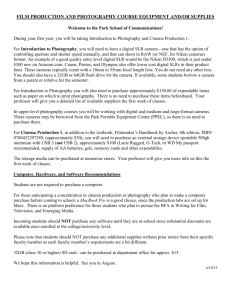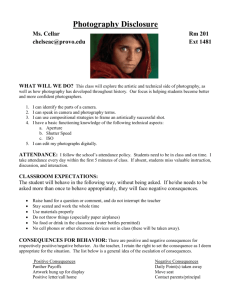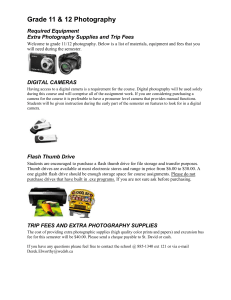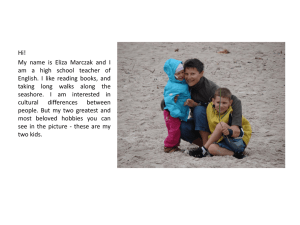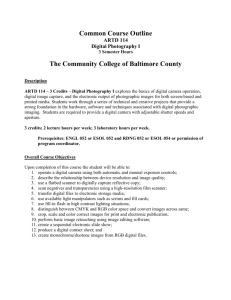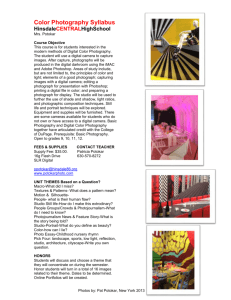Digital Photo Narrative
advertisement
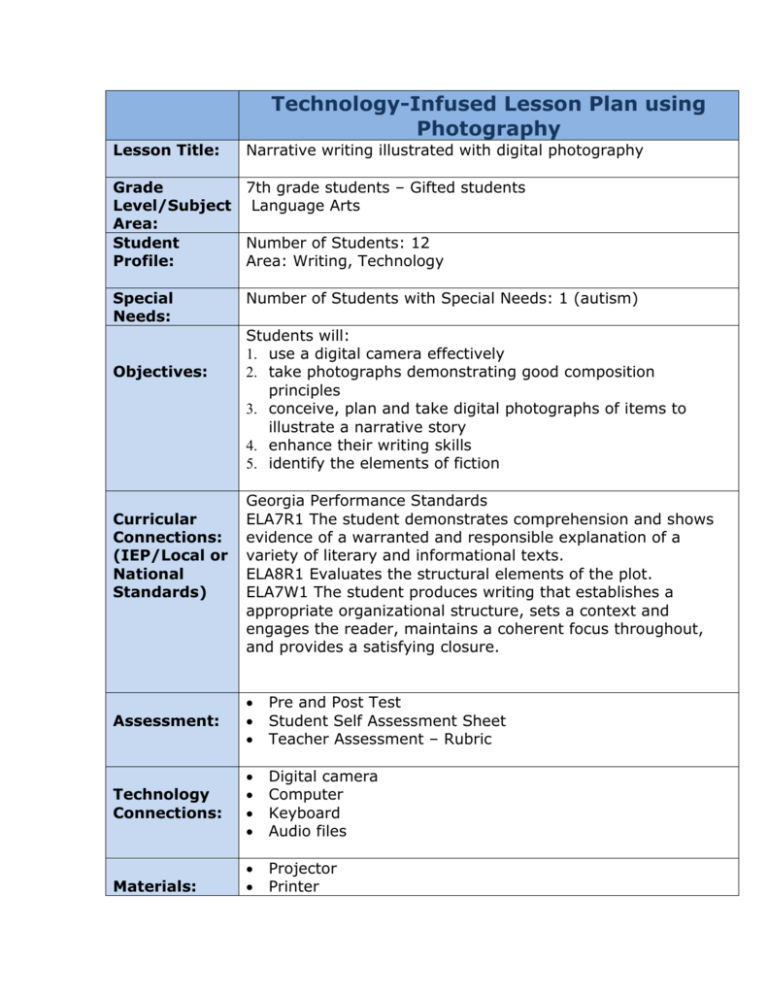
Technology-Infused Lesson Plan using Photography Lesson Title: Narrative writing illustrated with digital photography Grade 7th grade students – Gifted students Level/Subject Language Arts Area: Student Number of Students: 12 Profile: Area: Writing, Technology Special Needs: Objectives: Curricular Connections: (IEP/Local or National Standards) Number of Students with Special Needs: 1 (autism) Students will: 1. use a digital camera effectively 2. take photographs demonstrating good composition principles 3. conceive, plan and take digital photographs of items to illustrate a narrative story 4. enhance their writing skills 5. identify the elements of fiction Georgia Performance Standards ELA7R1 The student demonstrates comprehension and shows evidence of a warranted and responsible explanation of a variety of literary and informational texts. ELA8R1 Evaluates the structural elements of the plot. ELA7W1 The student produces writing that establishes a appropriate organizational structure, sets a context and engages the reader, maintains a coherent focus throughout, and provides a satisfying closure. Assessment: Pre and Post Test Student Self Assessment Sheet Teacher Assessment – Rubric Technology Connections: Digital camera Computer Keyboard Audio files Projector Printer Materials: Related URLs: (minimum of 3 required) 1. 2. Digital cameras Student worksheet (storyboard) Student Assessment sheet Rubric for Assignment Pre and Post tests on Photography Royalty Free Resource Site http://digitalstorytelling.coe.uh.edu/ Digital Storytelling http://digitalstorytelling.coe.uh.edu/royalty.html Royalty free clips to enhance your story. 3. http://www.creativenarrations.net/site/storybook/index.html Examples of digital stories. 4. http://www.thewritingsite.org/resources/genre/narrative.asp Writing Narratives (notes) Whole Group: Step 1: Read a short story (picture book works best) aloud to the class. Step 2: Review plot structure and plot the elements of the story you read together as a group. Step 3: Explain to the students that they will be completing an assignment using digital photography to enhance and illustrate a narrative piece of writing that they have created. Step 4: Give the students a pre-test on basic digital photography. Procedures: Small Group: Step 1: Students will complete a directed reading assignment related to the camera manual. Step 2: Students will brainstorm in small groups for digital story ideas including where to find pictures. Cooperative Group: NA Individual: Step 1: Handout the narrative digital story rubric and allow students to review the information and ask questions. Step 2: Handout the storyboards and give class time for students to begin crafting their story including picture ideas. Step 3: Students will be assigned a camera to capture pictures. Step 4: Using Imovie or MovieMaker students will upload pictures, text, audio. Step 5: Students will present their stories to the class. Classroom Management: Technology Management: Students will check out cameras through the library. We are fortunate that there are enough cameras for all 12 students. Students will have 4 class periods in which the class will reserve the computer lab for class time. Students will have access to both Imovie and MovieMaker. Students will need to convert files to .wmv to ensure the movie will play in the classroom for presentations. The classroom has computer access with @Quicktime and @Realplayer The classroom has an LCD projector connected to the computer and Smartboard. Instructional Groups: The entire class will be given a lesson on the elements of fiction as a review In small groups the students will have an opportunity to learn about digital photography and specific applications of the camera they will be using. In small groups the students will brainstorm ideas for narrative stories. Individually and through teacher-student conferencing the students will revise their stories on the storyboard. Individually students will upload photos, text, and audio to create a narrative digital story.

